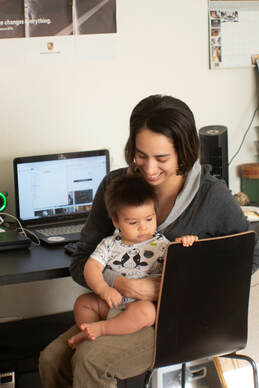|
Parents everywhere will attest to how crazy home life with children can be. It is normal for most children to often need attention and engagement from their caregivers, siblings, or friends. At the best of times, this constant stimulation can be exhausting for a parent. When children are sick, it is typical for them to need their loved ones more than usual... demanding snuggles, mind-numbing television, and contact naps. To be honest, I can think of worse scenarios. My littlest one is growing up faster than I like, and the cuddles and contact naps are becoming less with each passing day... As a parent who works full time with a job that involves crisis intervention and time-sensitive tasks, I am often taking phone calls that deal with emergency situations. Taking these calls and interrupting Cocomelon snuggle time is a recipe for disaster for everyone. Too often have I had to try to think on the spot and give directives to my staff, while having a little one scream-crying that I have broken contact with them to—Heaven forbid-- work. Is this striking a chord for anyone else? So what can a parent do if they are working from home while also trying to manage a sick little one? I returned from my maternity leave while many of the COVID restrictions were still in place. My daughter had just started daycare, my step boys started to attend school more regularly, and I was still working from home as my physical office building was closed. The daycare and school at that time had very strict protocols around children showing any COVID symptoms needing to isolate for up to 10 days. Those early days after my return from work involved a lot of juggling work and taking care of sick children. Never mind that I, too, was contracting everything that was being brought home by my 3 kids. I did a lot of learning around how to make everyone (mostly) happy through trial and error during these days. Here are some tips on how to make these days go as smoothly as possible for everyone:  Planning ahead: - If you are a new parent or returning to work from a parental leave, see about having a return-to-work discussion with your supervisor or Human Resources department before returning to work. In this discussion, you can talk about the reality of your (new) situation and what it will mean for you as a parent and as an employee. Strategize accommodation for when you inevitably have to be home when a child becomes sick. This accommodation can include working from home, adjusting certain tasks or your role, or making up lost hours at a different time when your child isn’t home sick. - Talk to parents, relatives, friends, and professional caregivers who are comfortable with helping your sick child even for short periods of the day. Their presence can distract them and take some of the stress off of your shoulders if you are able to work from home. Or, if you can’t work from home, you can rest assured that your child is in good hands with a trusted caregiver. Setting expectations: - For children: Explain to your children in age-appropriate ways that you need to continue to work when they are home sick. Explanations such as, “I need to keep working so that I can pay for toys/rent/dance lessons/etc” can be helpful for children to understand why a parent’s work day doesn’t stop when a child is sick. Set reasonable expectations for your children around time spent with you and time spent alone while you are working. Remember that older children will understand set expectations easier than younger children, and younger children may physically need you more than older children. - For yourself: Set reasonable expectations for yourself, too! Not many parents can give 100% of their usual output with children around, let alone sick children who need their parents more often than normal. If you can, move some tasks around to allow for breaks where you can spend time with your children so that they aren’t feeling lonely. Talk about what the work day looks like, and be prepared (and patient) to give reminders (“Remember that I have to make a call for work soon, but after that I will play with you.”). - For everyone: Remember how you feel and what you need when you are sick and empathize with your children during this time. Many people have low energy, low focus, want to graze on simple foods (if they have an appetite at all), and need comfort, fluids, and rest when feeling unwell. Remember that children likely want and need the same things as you when they’re sick. Try to loosen up on some of the typical rules and expectations; you can get back on track once everyone is feeling healthier. Keeping children occupied: - One way to make the situation of being home sick more fun is to have a special box of activities and toys that only come out during these days. You can include quiet activities that children can engage in that don’t require a lot of concentration such as colouring books, picture or easy-to-read books, fidget or other sensory toys, plush toys to cuddle, etc. Try involving your children in the creation of their special boxes ahead of time when they’re feeling well. - Have a tablet or TV set up, charged, and available to watch movies or shows. This is especially helpful for when you need to make and take phone calls or meetings that you can’t reschedule. Incorporate breaks from screens by also taking breaks and being with your children. Other considerations: - Try to plan meetings or important phone calls around nap and quiet times. I did this a lot when my youngest was sick and it worked extremely well for both of us! I was way less stressed about needing to split my attention between her and work knowing that a good stretch of uninterrupted work time was imminent. - Don’t be afraid to ask for help! This can be asking for someone to help occupy your child (even for a couple of hours) while you focus on work or talking to your supervisor about the situation and asking for what you need to help things go smoother. - If you have a partner who can also work from home, split up your days and work as a team to take care of your children, your workday, and yourselves. This can be helpful and less disruptive for the sick child if one parent needs to quickly run an errand. - Have go-to snacks readily available for your children (and you!). Snacks such as crackers, low-maintenance fruits (berries, bananas, apples, or grapes) and vegetables (bell peppers, carrot sticks), juice boxes, and yogurt tubes are easy to give to your children when you’re trying to focus on work. - Breaks are helpful to everyone. If the weather is nice, consider going for a short walk or even sitting outside. Sunlight, fresh air, and exercise is healing in so many ways! The early days of taking care of children when they’re sick may seem daunting and stressful if you are a parent needing to work. Planning ahead by having conversations with personal and work relations, preparing activities and schedules ahead of time, and talking about the expectations and realities of working from home with your children will help everyone to have an easier time with adjusting to the situation. Best of luck and gentle hugs. You got this! All the best, Krista, KKH Postpartum Doula
0 Comments
Parents of new babies can all agree that the postpartum period is nothing to scoff at. There are so many adjustments that parents and babies go through in the first couple of months that can make the postpartum period challenging, such as sleep disturbances, seemingly constant hunger (for the baby but also for a breastfeeding parent!), and not having time to tend to yourself, other members of your family, or your home. These adjustments can be extremely challenging (and I would argue impossible) for one or two people alone, especially if one parent needs to work, and are even more taxing when parents are not surrounded by their typical "village." This is why creating a meaningful support network is an imperative step in the postpartum planning process. Types of Support There are many types of support that will really benefit parents as they navigate this new chapter of their lives:
Where to Find Support Where to access these supports largely depends on where you live and, to a smaller degree, your income or work benefits. There are many ways to find the above listed resources in and around Calgary:
Under ideal circumstances, a family would start planning for the postpartum period before the baby arrives. However, sometimes that is not always feasible, or the plans a family did have in place needed to change due to events that are beyond the parent's control. Creating a support network is beneficial at any stage in the parenting journey. The most important thing to remember is that there is no shame in asking for help, even temporarily, to ensure that your needs and the needs of your family and home life are met.
If you have any questions or think I may be someone that you would want on your team, please feel free to reach out! I would love to hear from you! All the best, Krista, KKH Postpartum Doula  A lot of people I've talked to about my recent training as a postpartum doula look at me with a mix of excitement and hesitancy. "It's great that you're a postpartum doula! ... but, what exactly is a postpartum doula?" The lack of understanding is not lost on me. When I was talking to my husband about how I enrolled in my postpartum training and later when we were talking about my doula business, he admitted that he didn't know what a postpartum doula was until I explained it to him. Truth be told, I didn't know what they were either until I was about 9 months postpartum with my daughter and the role was first introduced to me. Given how rough the latter part of my maternity leave was, I wished that I had known about postpartum doulas sooner. There are families from a variety of cultural backgrounds that I've read about and spoken to about postpartum help that seem shocked at the prospect of parents not having help after a baby arrived. Postpartum support is built into the fabric of these cultures. Family members, community members, and (grand)parents all help new parents in their respective ways. Their support ensures that the birthing person especially gets much needed rest, nourishment, and nurturing to replenish what was lost after giving birth. There are many families who immigrate to countries such as Canada who find themselves blindsided at the lack of support after baby arrives. Sometimes, these new parents have family members come from their home country to support them for some time in the postpartum period. Other times, this cannot happen, such as during the COVID19 pandemic and airports were shut down. This is where additional supports, such as those from a postpartum doula, are so important. The term 'doula' is Greek for "a woman who serves." Postpartum doulas are individuals (usually women) who help or 'serve' parents in the fourth trimester (the first 12 weeks after a baby arrives). Most postpartum doulas are trained by recognized doula trainers. This helps to ensure that support given to families is done in a professional, uniform, and non-biased way. Even though postpartum doulas are trained professionals, they are not medical professionals. The help a postpartum doula offers is temporary while parents adjust to their new family dynamic. This can be especially appreciated when supports are limited, there are older siblings, or the parents had multiples (twins, triplets, etc). The support can be practical or emotional in nature and can include:
The ways a postpartum doula can help a family in the postpartum period are vast and also curated to what each family needs. The above list is by no means exhaustive, but I hope paints a picture of what all I-- and other postpartum doulas-- can do to support a family during this special time.
If you have any other questions about postpartum doulas, or are interested in meeting with me to see if my services are a match for your family, please don't hesitate to reach out! All the best, Krista, KKH Postpartum Doula  Hiring a postpartum doula can be a big investment for a family, especially a family that is in need of help ASAP. It is so important to know that your choice in hiring a doula is the right one. Postpartum doulas are individuals who help families in the fourth trimester (the first 12 weeks after giving birth or welcoming a baby into the family), during the postpartum period. Trained postpartum doulas oftentimes have evidence-based knowledge, experience, resources, and are unbiased in their approaches to support and care. Postpartum doulas are not medical professionals; they are, however, professionals trained in emotional, physical, and practical postpartum care. Postpartum doulas can be hired in advance-- before baby comes-- or may also be considered when parents are in the thick of it and struggling with all of the additional duties that come with a new addition to the family. No matter which camp you or a loved one may be in, having a list of questions and considerations to ask a postpartum doula before committing to signing a contract is key. Below are some questions you can ask a postpartum doula:
There are so many other great questions to ask a postpartum doula around a family's specific circumstances, so don't let this list limit you. Answers to these questions can provide parents with the confidence they need to move forward with hiring the right postpartum doula for their family's needs Other tips of note before hiring a doula:
I hope that these questions and tips help you (and your partner, if relevant) feel ready and confident to take that next step towards hiring a postpartum doula! |
AuthorKrista Kirkpatrick-Hatch, BA Psyc (Hons.) is a Postpartum Doula in Calgary, AB, Canada Archives
January 2024
Categories
All
|




 RSS Feed
RSS Feed
